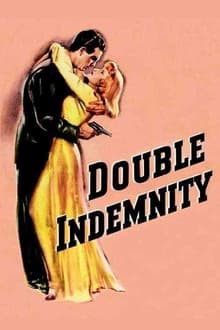
A magnificent "noir" with great actors, which was unlucky at the awards, and was immortalized by the public, surviving fresh to this day.
I've previously had the opportunity to mention that I really like noir films, and this is another one that I had the pleasure of seeing and will save for occasional rewatches. Based on a good detective novel, the film is extremely intelligent, dark and well articulated. Made in 1944, still during the Second World War, it was nominated the following year for seven Oscars (Best Film, Best Director, Best Actress, Best Screenplay, Best Sound, Best Black-and-White Cinematography and Best Original Soundtrack for Comedy or Drama). I naturally wasn't alive at the time, but I imagine it was one of the favorite films at that year's awards gala. Interestingly, and not without injustice, it lost them all.
Directed in a very intelligent and effective way by Billy Wilder (who was one of the great directors of Hollywood's golden era), the film has excellent cinematography, with magnificent clarity and play of light that takes advantage of the sun, shutters and other forms of soften the brightness when necessary. The soundtrack, by Miklós Rózsa, is very well-used and atmospheric. The script is excellent and was based on a very good dramatic story: an insurance agent is seduced by a woman and then tricked into helping her kill her husband and receive the money from a huge accident insurance policy. It turns out that insurance companies can be more meticulous than the police and, while the authorities are satisfied with an “accident”, some elements of the company are not uninterested in the matter. Could it have been better? Perhaps if the man's death was more nebulous and the perpetrator was not evident.
Fred MacMurray had, in this film, the opportunity to give the greatest performance of his entire film career. Despite being a good actor and having participated in more projects, it was this film that immortalized him and meant that his name did not disappear completely. It's not a perfect performance, the actor is a little too theatrical at times, but it worked great. The role of the femme fatale was masterfully played by Barbara Stanwick, another great actress who deserves applause for the work developed here. In addition to being very beautiful, she gave the character an aura of perfidy and callousness, and had an exceptional rapport with MacMurray, full of tension and restrained desire. Despite being away from the spotlight, the secondary cast does a competent job: the efforts of Edward G. Robinson and Jean Heather deserve to be highlighted.